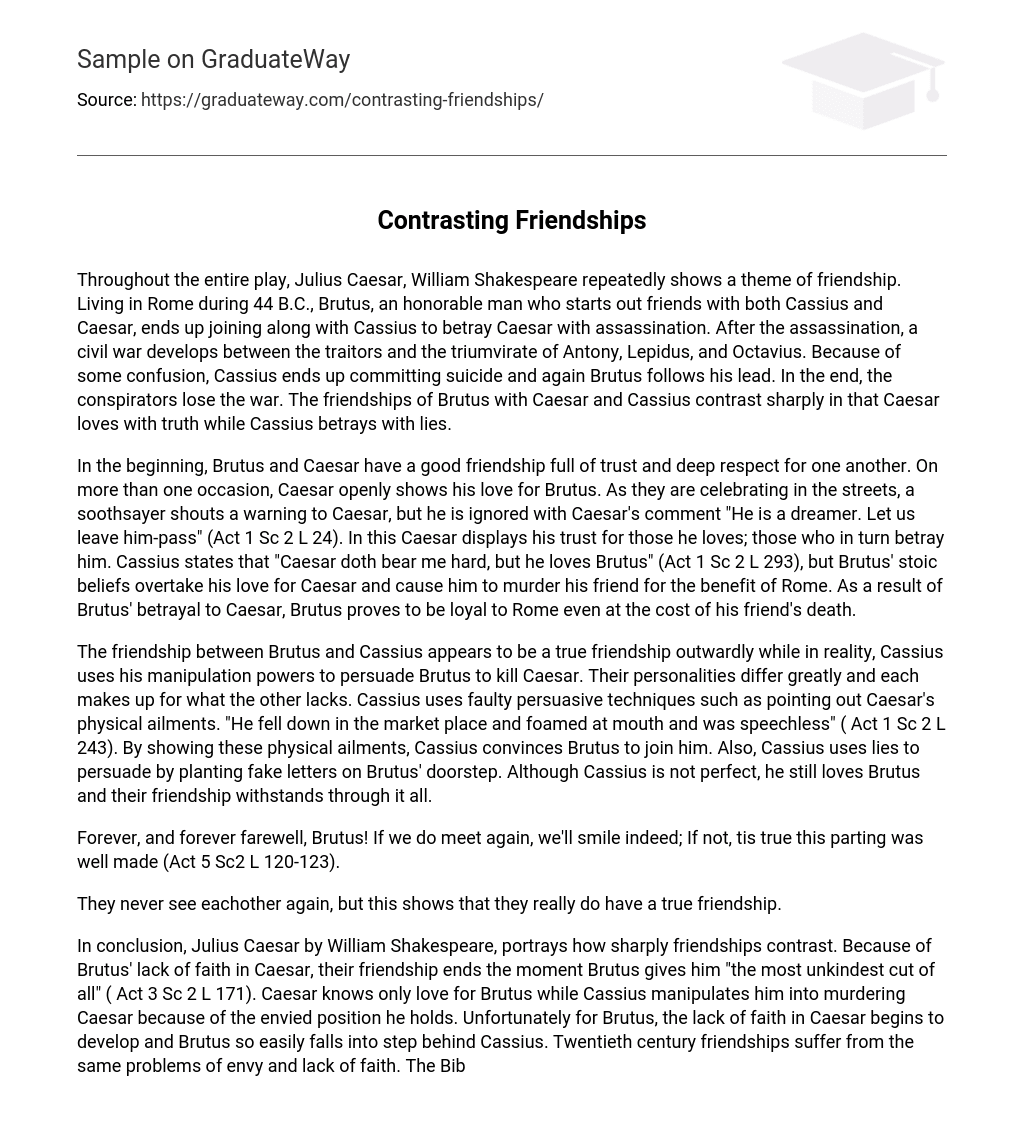William Shakespeare extensively delves into the theme of friendship in his play, Julius Caesar, which is set in Rome during 44 B.C. The character Brutus, who was initially a friend to both Cassius and Caesar, eventually becomes entangled in a plot with Cassius to murder Caesar.
After the assassination, a civil war breaks out between the betrayers and Antony, Lepidus, and Octavius. In the midst of some confusion, Cassius ultimately commits suicide, which influences Brutus to do the same. Eventually, the conspirators are defeated in the war. The friendships of Brutus with Caesar and Cassius greatly contrast as Caesar shows love through honesty while Cassius deceives with falsehoods.
In the beginning, Brutus and Caesar have a strong bond characterized by trust and profound admiration. Caesar openly expresses his affection for Brutus multiple times. While celebrating in the streets, a soothsayer interrupts with a cautionary message, but Caesar dismisses him, remarking, “He is a dreamer. Let us leave him-pass” (Act 1 Sc 2 L 24).
Caesar’s trust in his loved ones is destroyed when they ultimately betray him. Cassius recognizes that Caesar harbors animosity towards him, but he has great love for Brutus. Nevertheless, Brutus’ lack of emotion surpasses his fondness for Caesar and drives him to murder his comrade in the name of Rome. In betraying Caesar, Brutus displays his unquestionable devotion to Rome, even if it necessitates sacrificing the life of his beloved friend.
Cassius manipulates Brutus into assassinating Caesar, even though their friendship may seem genuine. Despite their contrasting personalities, they complement each other’s weaknesses. To convince Brutus, Cassius uses flawed tactics like emphasizing Caesar’s physical ailments – “He fell down in the market place and foamed at mouth and was speechless” (Act 1 Sc 2 L 243). By exploiting these bodily afflictions, Cassius successfully convinces Brutus to join his cause. Additionally, Cassius resorts to deceit by leaving forged letters on Brutus’ doorstep. However, despite his imperfections, Cassius still genuinely cares for Brutus and their friendship withstands all challenges.
Forever, and forever farewell, Brutus! If we do meet again, we’ll smile indeed; If not, tis true this parting was well made (Act 5 Sc2 L 120-123). This demonstrates that despite never seeing each other again, they truly share a genuine friendship.
In summary, William Shakespeare’s play Julius Caesar illustrates the stark contrast between friendships. Brutus’ betrayal of Caesar automatically terminates their friendship when he delivers the “most unkindest cut of all” (Act 3 Sc 2 L 171). While Caesar only harbors love for Brutus, Cassius takes advantage of this friendship to manipulate Brutus into assassinating Caesar due to his coveted power.
Regrettably, Brutus finds himself succumbing to Cassius due to growing doubts about Caesar. Similar issues of envy and distrust plague friendships in the twentieth century. The Bible affirms that the greatest love is demonstrated when an individual sacrifices their life for their friends. Instead of protecting his friend, Brutus chooses to end his life.





